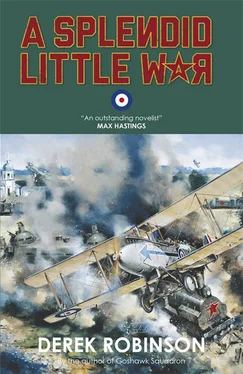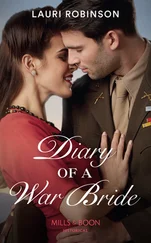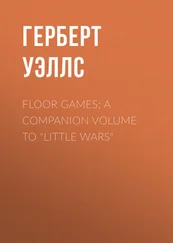General Gregorioff was a tubby little man, almost bald, with a thick black moustache that reached his chin. He greeted his guests cheerfully, without moving from a cane chair overflowing with pillows. His right leg rested on a stack of blankets. He had no English. He and Borodin exchanged compliments, and the count explained to Wragge that the general had very bad gout and was on medical leave from the Front. That explained the young and attractive nurse.
“Ask him where the three White fighter squadrons are,” Wragge said. “And the aerodrome?”
Armchairs were brought, and they settled down to a friendly chat. Wragge examined the general’s quarters. Bookshelves, a baby grand piano, family photographs, thick carpet, velvet curtains. Not Spartan. Coffee was served. Good coffee, better than The Dregs. The general was an affable man, and whatever Borodin was saying to him, it made him laugh.
Then the audience was over. Everyone smiled happily. An aide opened doors and helped them descend from the train without breaking a leg.
“What did you get out of him?” Wragge asked. “Apart from merry laughter.”
“For a start, the three squadrons of White fighter aircraft don’t exist. Nor does the aerodrome. Denikin has no machines, except us.”
“I see,” Wragge said. “No, I don’t. What about that signal from Mission H.Q? Colonel Somebody. Boss of Aviation.”
“Subasnov. The general was very amused by that story. He knows Subasnov well. The colonel was on Denikin’s staff, the biggest chump in the army, couldn’t be sacked because of his political connections, so Denikin gave him Aviation and sent him as far away as possible to bother someone else. The general says Subasnov talks magnificently. If talk won wars, we would be in Moscow now.”
“So he lied.”
“Yes and no. To an Anglo-Saxon he lied unforgivably. To Russians he adjusted the facts to agree with the way the truth ought to be. A great army deserves to have an air force, and of course Mission H.Q. was impressed by what he said.”
“Absurd. He must have known he’d be found out.”
“True. But Russians can’t stop themselves. There’s a word for that kind of lying. We call it vranyo . It satisfies some inner need. Russians lie even when they know the listener knows they’re lying. So, vranyo does no harm, does it?”
“ Nichevo ,” Wragge said. “Is that right, nichevo? ”
“Excellent. You are thinking like a Russian.”
“And the promise of an armoured train. Was that vranyo ?”
“In its purest form. By the way: Denikin had one aeroplane. The Halberstadt two-seater. He sent it to count his troop trains because the telegraph line was broken.”
“We shot down a friendly machine.”
“General Gregorioff says the telegraph is working now.”
“So… nichevo again.”
“His very word.”
“Mine too. From now on we’ll fight like Russians. We’ll vranyo like fury and if anyone doesn’t like it, nichevo .” Wragge shouted for Maynard, ordered him to fly back to the trains and tell them to move up to the racetrack sidings. “Tomorrow we go to Kursk,” he said. “That’s where the fun and games are happening.” He said nothing about the Halberstadt. Fog of war. Forget it.
1
The gardens at 10 Downing Street were neither large nor glorious, but at least the roses were splendid at this time of year. The Prime Minister preferred to hold his garden parties there. It meant he didn’t have to trudge around somebody else’s pride and joy, shaking hands with strangers until his knuckles ached. It meant that as soon as the party was over, he could get back to his desk. And if it rained, there were always drawing rooms for the guests to shelter in.
He kept the guest list short. Senior Cabinet members, a few ambassadors, some admirals and generals, maybe an artist or a poet, if they were house-trained. No novelists, no playwrights. Drank too much, got into arguments with other guests. Not garden-party material.
The guest list was one of Jonathan Fitzroy’s duties, and he quietly added the names of his Ad Hoc Committee on Russia. It was a white-tie occasion, so the garden would look like a penguin colony, and that answered the need for secrecy: his committee would hide in plain sight.
When the P.M. had done enough partying and withdrawn, and the guests were leaving, the committee gathered in a little summerhouse. Fitzroy put a pack of cards on the table. “A harmless subterfuge,” he said. “In case anyone looks in.”
Weatherby dealt a few cards. “I can’t play anything except Snap,” he said. “My children are demons at Snap. I never stand a chance.”
“Mine were like that,” Delahaye said, “until I began to cheat. That fooled them.”
“You’ve got to be ruthless with children, in my experience,” General Stattaford said. “Or they lose all respect. My parents were quite foul to their children, I’m happy to say. It made a man out of me.”
“The modern child is over-educated, in my opinion,” Sir Franklyn said. “I heard my granddaughter singing ‘Lloyd George is my father, father is Lloyd George’. The child is only nine. I asked her what it meant and she said she didn’t know.”
“I bet she did,” Weatherby said. “They know everything.”
“Perhaps we should ask them to advise us,” Fitzroy said. He was a bachelor; other people’s children bored him. “A little omniscience about Russia might be helpful.”
“Not any more,” the general said. “The Reds are routed. Denikin’s on a charge. In war, momentum is everything. We proved that in France. Once we broke the enemy line, the Huns couldn’t stop running. Reds are the same.”
“But not in Siberia,” Sir Franklyn said. “They seem to have the better of Admiral Kolchak.”
“A sideshow. Denikin’s campaign is the key. Poltava has fallen. Kharkov has fallen. Kiev has fallen. Odessa won’t hold out much longer. Denikin will take Kursk. Then it’s a straight run to Moscow.”
“Napoleon said that too,” Delahaye said. “Mind you, it probably had more panache in French.”
“His mistake was getting the weather wrong,” Weatherby said. “Beaucoup de neige . Dreadfully froid . Hadn’t done his homework.”
“And no railways. So no return tickets.”
“Denikin has got everything spot-on right,” Stattaford said. “Summertime, and the railways lead to Moscow. All he needed was a spell of training, courtesy the British Army, to stiffen his ranks. I never doubted it.”
“Excellent. Now, how do we translate this for the P.M.’s benefit?” Fitzroy asked. “Triumph of right over wrong? Death-blow to Communist world domination? Last battle of the Great War, and Britain helped to win it? What’s the message?”
“Well now,” Sir Franklyn said. “Russia is a very big country. Let us not cheer too soon.”
“The Treasury will cheer if Denikin takes Moscow,” Charles Delahaye said. “Then we can stop throwing money at Russia with both hands.”
“Penny-pinchers,” the general said. “We didn’t beat the Kaiser by double-entry bookkeeping. Whatever that is.”
“There’s a difference. Russia is not about to invade Britain.”
“Undeniable,” Fitzroy said. “Still, I wonder if there’s something in Denikin’s success for the P.M. D’you remember that excellent phrase of Sir Franklyn’s? ‘Answering the call of freedom and justice’. Well, we’ve done it, and surely it’s earned us the right to… um… to reward ourselves. Or words to that effect.”
“What effect?” Stattaford said.
“Reward means only one thing,” Weatherby said. “Higher wages. And if you want to avoid bloody Bolshevik revolution in Britain, that’s what you should do, and do it now.”
Читать дальше











